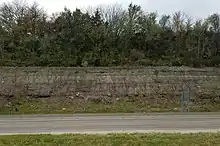Roca Formation (United States)
The Roca Formation (or Roca Shale) is an early Permian geologic formation (Wolfcampian) with its exposure running north and south through Kansas and extending into Nebraska and Oklahoma, notably comprising varicolored black, brown, gray, green, red, and blue shales, mudstones, and limestone, some of which representing Permian paleosols.[1][2]
| Roca Formation Stratigraphic range: early Permian | |
|---|---|
 Multicolored Roca Shale, well-exposed along Seth Child Road in Manhattan, Kansas, marked by the Howe limestone below and the Sallyards limestone and Legion shale above. | |
| Type | Formation |
| Lithology | |
| Primary | Shale and mudstone |
| Other | Limestone |
| Location | |
| Region | Midcontinent (Nebraska, Kansas, Oklahoma)[1] |
| Country | United States |
| Type section | |
| Named for | Roca, Nebraska[1] |
See also
References
- Jewett, John M. (1941). The Geology of Riley and Geary Counties, Kansas, Kansas Geological Survey Bulletin 39. University of Kansas Publications, State Geological Survey of Kansas.
[ Roca, Nebraska is in Lancaster County, Nebraska ]
- "Geologic Unit: Roca". National Geologic Database. Geolex — Unit Summary. United States Geological Survey. Retrieved 2019-06-02.
This article is issued from Wikipedia. The text is licensed under Creative Commons - Attribution - Sharealike. Additional terms may apply for the media files.